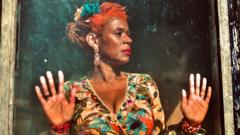Cape Verdean musician Carmen Souza has recently unveiled her innovative album, "Port'Inglês," which explores the historical ties between Cape Verde and British maritime culture. As a child, Souza learned the Creole word "ariope," meaning "hurry up," which was influenced by English. This sparked her curiosity about the connection between the languages, which led her to research the 120-year British presence in Cape Verde.
Souza, known for her jazz-infused style, sought to understand how this historical relationship impacted local music. Her exploration revealed that British merchants settled in Cape Verde during the 18th and 19th centuries, transforming it into a key refueling stop for oceanic trade between Europe and the Americas. This interaction prompted a blend of local and foreign musical traditions that Souza now captures in her work.
Inspired by both personal and historical narratives—such as her grandfather's role in loading coal for British ships—Souza created songs for the album that weave together traditional Cape Verdean rhythms with English sea shanties. This includes funaná and batuque, letting listeners experience rhythms that echo the historical Portuguese rule and British maritime influences.
Souza’s research also uncovered early accounts of Cape Verdean music, noting that many musical genres reflect the island's rich history, despite the Portuguese restrictions on certain cultural expressions. References from key historical figures, including Charles Darwin, highlight the vibrant musical landscape of the islands.
Now living in London, Souza aims to inspire a new generation of musicians in Cape Verde, reviving interest in traditional styles while inviting modern interpretations. Her album represents a celebration of Cape Verdean identity and resilience, merging its past with contemporary sounds, while emphasizing the importance of cultural preservation and innovation.




















